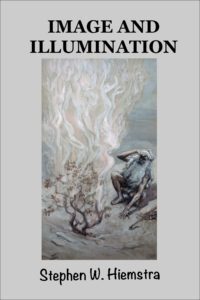Under God

Si Dieu n’existait pas, il faudrait l’inventer. (Voltaire 1768)
By Stephen W. Hiemstra
Out of respect for Voltaire, perhaps, since 1956 U.S. currency bears the inscription, In God We Trust, in spite of much complaining from atheists.1 Voltaire’s (1768) comment that “If God did not exist, it would be necessary to invent him” bears witness to the communal need for a common set of values, purpose, and loyalty without which community becomes much less likely.
Centering on the image of God unites us even in the absence of faith.
The Devolution Problem
The devolution of society today is a painful reminder of how de-centering leads to degeneration.
The effect is much like the problem of transacting business without a common currency. Coinage allows transactions to take place between two parties whose lack of common needs might otherwise make a barter transaction difficult. Consider barter between a country doctor and a chicken farmer. How many chickens is delivering a baby worth? Suppose the doctor charges one hundred chickens, how do the chickens get transported? What happens to the chickens between chicken dinners? What if the doctor delivers another chicken farmer baby that week? Business is so much easier if the doctor gets paid in a common currency.
Removing a common currency not only raises the cost of doing business, it demotivates civility and lowers productivity. Early in my career, I was a country analyst for USDA and shared an office with an expat, Russian analyst—let me call him, Yuri. Accustomed to living in a planned society with an active black-market tradition, when Yuri wanted to sell a car, he spent the entire day calling up his expat friends trying to find a buyer. Where we might trade a used car with a dealer or place an ad online, Yuri spent his day searching for a friend of a friend interested in a car.
Language Generation
Language is the most important commodity of culture. Historically, the translation of the Bible into local dialects has been an important catalyst in development of national languages.
For a thousand years, Latin played a key role in the development and cultural unity of Western civilization. Luthers’ Bible helped unify high German accord the many germanic principalities. The King James Bible was the one and only book owned by most English-speaking people for about five hundred years. Languages not written down tend to devolve more quickly in a kind of Tower-of-Babel effect (Gen 11).
Linguist Guy Deutscher (2005, 1) begins a study of the evolution of language with an audacious claim that: “The advent of language is what made us human.” Even the Einstein of chimps, Kanzi, who can recognize up to 500 words and simple sentences, cannot string together these symbols and form real sentences. The human brain appears pre-wired for language, even if the potential was slow to be realized (Deutscher 2005, 17-19).
Pre-wiring is an interesting synonym for creation. It is curious that the God who spoke the universe into being would create us with inborn proclivity to speak. What does it mean again to be created in the image of God?
General Revelation
A common thread running through the blessings of a life centered on faith in God is that these blessing represent a general revelation of God. One of the most important blessings we have seen during the COVID pandemic is the development of an effective vaccine in less than a year, something completely unprecedented in medical history with implications for all of humanity. Do you credit God or science for this vaccine? For years, I have described scientific discoveries as God’s Easter eggs—treats that we as parents hide where we know our kids will find them.
Confronted with an undeserved blessing, how do you respond? In Luke 17:12-19, we read the story of how Jesus healed ten lepers, yet only one, a Samaritan, returned to Jesus to give thanks. Oftentimes, the only difference between a general revelation and a special revelation of scripture is our response in thanksgiving, relationship, and faith.
References
Deutscher, Guy. 2005. The Unfolding of Language: An Evolutionary Tour of Mankind’s Greatest Invention. New York: Henry Holt and Company.
OEuvres. 1885. Complètes de Voltaire. Edited by Louis Moland. Translated by Jack Iverson. Paris: Garnier, 1877-1885. Tome 10, 402-405.
Voltaire. 1768. “Epître à l’auteur du livre des Trois imposteurs.” Taken from OEuvres 1885. Online: https://www.whitman.edu/VSA/trois.imposteurs.html#english. Accessed: 7 March 2022.
Footnotes
1 https://en.wikipedia.org/wiki/In_God_....
Under God
Also see:
The Who Question
Preface to a Life in Tension
Other ways to engage online:
Author site: http://www.StephenWHiemstra.net
Publisher site: http://www.T2Pneuma.com
Newsletter at: https://bit.ly/hot_2022, Signup
The post Under God appeared first on T2Pneuma.net.



